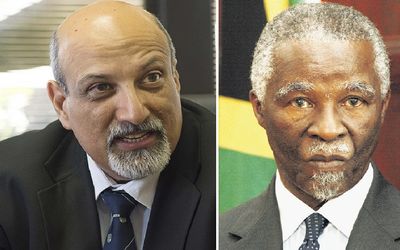TOP HIV scientist Salim Abdool Karim dismissed on Monday former president Thabo Mbeki’s latest pronouncements on AIDS as unscientific "drivel".
Prof Abdool Karim, who is co-director of the Centre for AIDS Research in Africa at the University of KwaZulu-Natal, said Mr Mbeki was "still lost in a past we have long moved on from".
In a letter published on his institute’s website, Mr Mbeki identified himself as the author of a controversial document that influenced the views of many senior ANC members in his administration and said he had never claimed HIV did not cause AIDS.
The letter is the latest in a series of missives Mr Mbeki has released aimed at clarifying his positions on issues while he was in office.
He was SA president from 1999 to 2008 when SA’s HIV/AIDS epidemic soared to become one of the world’s worst.
Mr Mbeki’s administration refused to provide antiretroviral (ARV) treatment, a stance that influenced the premature death of 330,000 people between 2000 and 2005, according to Harvard University researchers.
By 2014, an estimated 6.8-million South Africans were infected with HIV and the government now runs the world’s biggest treatment programme, reaching more than 3-million people.
Since the provision of ARVs began in earnest under President Jacob Zuma’s administration, life expectancy has risen from its low of just under 43 years in 2004, to 62.5 years last year, according to Statistics SA figures.
"What I said is that ‘a virus cannot cause a syndrome’. As you know, AIDS is an acronym for Acquired Immune Deficiency Syndrome — therefore AIDS is a syndrome, i.e. a collection of well-known diseases, with well-known causes. They are not, together, caused and cannot be caused by one virus!" said Mr Mbeki in his letter.
"He is simply ill-informed," said Prof Abdool Karim. "The truth is viruses can cause syndromes, and HIV is one that does."
Mr Mbeki was one of the authors of a widely circulated document written in 2002 entitled, "Castro Hlongwane, Caravans, Cats, Geese, Foot and Mouth and Statistics", a diatribe against what it calls "the thesis of HIV/AIDS".
It was distributed ahead of a key ANC national executive council meeting that supported his opposition to provision of ARVs.
"The title is enough to tell you it is nonsensical drivel. It’s a bunch of quotations that are so out of context, it is reduced to half-truths," said Prof Abdool Karim.
In his letter, Mr Mbeki wrote that AIDS was only the ninth most common cause of death in SA in 2006, and was not deserving of the attention it garnered.
"Why did it come about that so much noise was made internationally about the ninth leading cause of death in our country‚ with not even so much as a whimper about the first leading cause of death‚ tuberculosis? Did this have to do with the fact that SA could be a lucrative market for the sale of ARVs‚ as it now is?" he asked.
Prof Abdool Karim said that at the time, the stigma associated with HIV was such that it was under-reported as a cause of death. Mr Mbeki’s figures were out of date, as the three most recent mortality reports from Statistics SA identify HIV and TB as the two leading causes of death, he said.
Section27 executive director Mark Heywood, who was among the activists who led the civil society campaign for access to antiretroviral treatment, said Mr Mbeki’s letter "cast doubt over his suitability for any public role".
"We knew that a letter on AIDS was inevitable, but I think many of us expected that it would be in the form of claims that he was misrepresented and only acting with the best interests of the population," Mr Heywood said.
"Instead, what we have is a letter that more frankly than ever allies himself with AIDS denialism, (that) picks selectively at ad hoc bits of ‘evidence’ that seem to support (his) thesis and ignores everything that has happened since then," he said.
The letter was a distraction, but would do little harm, said Mr Heywood.
"Our response to HIV is now too deeply entrenched."

Salim Abdool Karim and Thabo Mbeki. Pictures: TREVOR SAMSON, ALIX CARMICHELE
TOP HIV scientist Salim Abdool Karim dismissed on Monday former president Thabo Mbeki’s latest pronouncements on AIDS as unscientific "drivel".
Prof Abdool Karim, who is co-director of the Centre for AIDS Research in Africa at the University of KwaZulu-Natal, said Mr Mbeki was "still lost in a past we have long moved on from".
In a letter published on his institute’s website, Mr Mbeki identified himself as the author of a controversial document that influenced the views of many senior ANC members in his administration and said he had never claimed HIV did not cause AIDS.
The letter is the latest in a series of missives Mr Mbeki has released aimed at clarifying his positions on issues while he was in office.
He was SA president from 1999 to 2008 when SA’s HIV/AIDS epidemic soared to become one of the world’s worst.
Mr Mbeki’s administration refused to provide antiretroviral (ARV) treatment, a stance that influenced the premature death of 330,000 people between 2000 and 2005, according to Harvard University researchers.
By 2014, an estimated 6.8-million South Africans were infected with HIV and the government now runs the world’s biggest treatment programme, reaching more than 3-million people.
Since the provision of ARVs began in earnest under President Jacob Zuma’s administration, life expectancy has risen from its low of just under 43 years in 2004, to 62.5 years last year, according to Statistics SA figures.
"What I said is that ‘a virus cannot cause a syndrome’. As you know, AIDS is an acronym for Acquired Immune Deficiency Syndrome — therefore AIDS is a syndrome, i.e. a collection of well-known diseases, with well-known causes. They are not, together, caused and cannot be caused by one virus!" said Mr Mbeki in his letter.
"He is simply ill-informed," said Prof Abdool Karim. "The truth is viruses can cause syndromes, and HIV is one that does."
Mr Mbeki was one of the authors of a widely circulated document written in 2002 entitled, "Castro Hlongwane, Caravans, Cats, Geese, Foot and Mouth and Statistics", a diatribe against what it calls "the thesis of HIV/AIDS".
It was distributed ahead of a key ANC national executive council meeting that supported his opposition to provision of ARVs.
"The title is enough to tell you it is nonsensical drivel. It’s a bunch of quotations that are so out of context, it is reduced to half-truths," said Prof Abdool Karim.
In his letter, Mr Mbeki wrote that AIDS was only the ninth most common cause of death in SA in 2006, and was not deserving of the attention it garnered.
"Why did it come about that so much noise was made internationally about the ninth leading cause of death in our country‚ with not even so much as a whimper about the first leading cause of death‚ tuberculosis? Did this have to do with the fact that SA could be a lucrative market for the sale of ARVs‚ as it now is?" he asked.
Prof Abdool Karim said that at the time, the stigma associated with HIV was such that it was under-reported as a cause of death. Mr Mbeki’s figures were out of date, as the three most recent mortality reports from Statistics SA identify HIV and TB as the two leading causes of death, he said.
Section27 executive director Mark Heywood, who was among the activists who led the civil society campaign for access to antiretroviral treatment, said Mr Mbeki’s letter "cast doubt over his suitability for any public role".
"We knew that a letter on AIDS was inevitable, but I think many of us expected that it would be in the form of claims that he was misrepresented and only acting with the best interests of the population," Mr Heywood said.
"Instead, what we have is a letter that more frankly than ever allies himself with AIDS denialism, (that) picks selectively at ad hoc bits of ‘evidence’ that seem to support (his) thesis and ignores everything that has happened since then," he said.
The letter was a distraction, but would do little harm, said Mr Heywood.
"Our response to HIV is now too deeply entrenched."





















Change: -0.47%
Change: -0.57%
Change: -1.76%
Change: -0.34%
Change: 0.02%
Data supplied by Profile Data
Change: -1.49%
Change: 0.09%
Change: -0.47%
Change: 0.00%
Change: -0.02%
Data supplied by Profile Data
Change: 0.48%
Change: 0.90%
Change: 0.36%
Change: -0.15%
Change: 1.05%
Data supplied by Profile Data
Change: 0.23%
Change: -0.32%
Change: 0.26%
Change: -1.05%
Change: -1.41%
Data supplied by Profile Data